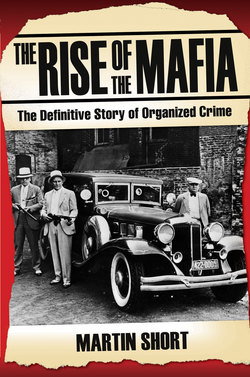Читать книгу The Rise of the Mafia - Martin Short - Страница 5
На сайте Литреса книга снята с продажи.
Introduction
ОглавлениеOrganized crime is America’s biggest business. According to some estimates. its profits are greater than those of Fortune magazine’s top 500 business and industrial corporations added together. One estimate accepted by the US Senate in 1979 assessed major crime revenues in America at over $160 billion a year. By 1984 the annual retail value of illegal narcotics alone had risen to anything between $50 billion and $100 billion. Organized crime worldwide in all its forms now (including vastly expanded corporate fraud and people-smuggling activities) has a turnover running into hundreds of billions of dollars.
But what is organized crime? I appropriate here two attempts at a definition of organized crime. The shorter version comes from Ralph Salerno, the eminent former New York detective:
Organized crime is a self-perpetuating, continuing criminal conspiracy for profit and power, using fear and corruption and seeking immunity from the law.
A longer definition comes from the Task Force Report on Organized Crime, published in 1967:
Organized crime is a society that seeks to operate outside the control of the American people and their governments. It involves thousands of criminals, working within structures as complex as those of legitimate governments. Its actions are not impulsive but rather the result of intricate conspiracies carried on over many years and aimed at gaming control over whole fields of activity in order to amass huge profits.
The core of organized crime activity is the supply of illegal goods and services – gambling, loansharking, narcotics and other forms of vice – to countless numbers of citizen customers. But organized crime is also extensively involved in legitimate business and in labor unions. Here it employs illegitimate methods – mono-polization, terrorism, extortion, tax evasion – to drive out or control lawful ownership and leadership to exact illegal profits from the public, And to carry on its many activities secure from governmental interference, organized crime corrupts public officials.
I can foresee that there may be places where a torrent of concentrated fact might confuse the general reader. This seems most likely when I refer to the five Mafia crime families of New York. I attempt a summary here. What began in 1931 as the Lucky Luciano family is now known as the Vito Genovese family. What is known today as the Carlo Gambino family was originally led by the Mangano brothers and then by Albert Anastasia until he was murdered in 1957. The three smaller families are the Joe Colombo family (formerly led by Joes Profaci and Magliocco), the Joe Bonanno family (named after its founder boss, who died in 2002 aged 97) and the Tommy Lucchese family, founded by Jack Gagliano. The families are now led by men with different surnames but all five families have retained the names of their bosses in the 1960s. These names are, of course, accorded by law enforcement rather than by the mafiosi themselves.
Most of the quotations, unless otherwise attributed, are taken from my filmed interviews for the television series.
My use of the word ‘Mafia’ throughout the text may not be true to a strict interpretation of the word, meaning a purely Sicilian organization. This the Mafia in America today is certainly not. However, Mafia is the only term which can adequately convey the true power and awesome strength of this octopoid conspiracy. Euphemisms like La Cosa Nostra or Traditional Organized Crime are best left to law enforcement and politicians.
I use the term ‘racket’ to describe any crooked manipulation of a legitimate or outwardly legitimate business or activity. Sometimes I have applied it to wholly illegal operations such as narcotics. The word apparently originates from the Saturday night dances or soirées, known as rackets, held at Tammany Hall in the nineteenth century. They were called rackets because of the appalling noise made by the carousers who attended. Since most of them were crooked politicians and their criminal friends, it was not long before the words ‘racket’ and ‘racketeer’ acquired their corrupt meaning. The noise of those long-gone Tammany celebrations is still ringing in our ears.
